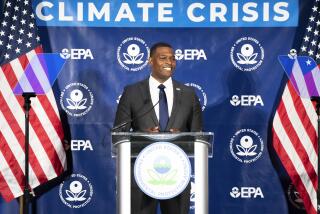Bush to set ‘realistic’ goals to combat global warming
- Share via
WASHINGTON — Under pressure from Congress and the courts, President Bush will unveil a plan today to set medium-range goals for reducing the gases that are blamed for global warming, administration officials said.
Bush will speak from the Rose Garden, calling for a general strategy to address climate change rather than a specific proposal to address emissions by industries, motor vehicles and other sources frequently cited in the debate over rising world temperatures.
“The president will frame the debate for the right and wrong ways to do it,” Deputy White House Press Secretary Tony Fratto said.
The president has placed his greatest emphasis on using technology -- for instance, reducing reliance on gasoline by developing hydrogen-fueled engines for cars -- to combat global warming, and has long opposed government mandates that would order consumers and companies to reduce their appetites for oil or other fossil fuels.
Bush, who has been criticized for inaction on what is widely seen as one of the most crucial issues facing the world, is seeking to set the boundaries for a debate occurring across multiple fronts, and which threatens to spiral beyond the administration’s control.
Last June, on the eve of a major international summit that would focus on climate issues, Bush proposed that the U.S. and more than a dozen other nations that produce 85% of the greenhouse gas emissions initiate a campaign to limit the gases and set long-term goals for their reductions. He set the end of his term as a target for establishing those goals.
Those nations will meet in Paris on Thursday and Friday. Bush’s new proposal is intended to demonstrate that the U.S. is making an effort to tackle the issue in the near future while the international efforts focus on the longer term.
The negotiations among the major emitters of greenhouse gases are intended to move beyond the 1997 Kyoto Protocol, which requires 37 industrialized nations to cut their emissions by an average of 5% from 1990 levels by 2012.
The U.S. never ratified the agreement, but the Bush administration joined in December with nearly 200 other nations in a pledge to reach a new agreement by the end of 2009.
On Capitol Hill, meanwhile, Senate Majority Leader Harry Reid (D-Nev.) has called for Senate action on climate change and has scheduled debate on legislative remedies for the first week in June.
In addition, the administration worries that a variety of laws will force government agencies to act, in some case prodded by court rulings.
For example, the Endangered Species Act could be used to force changes that protect polar bears, whose icy habitat is melting.
Another law, the Clean Air Act, could be used to force the Environmental Protection Agency to take stricter action following last year’s Supreme Court ruling that carbon dioxide, a leading greenhouse gas, is a pollutant that can be regulated.
The administration is concerned that the laws were drawn up for other environmental purposes before global warming had become a center of scientific and public focus.
“You . . . have the regulatory train that’s left the station and headed for a wreck,” White House Press Secretary Dana Perino said Tuesday. She said the administration opposed all of the legislative proposals under consideration.
She called Bush’s proposal a “realistic intermediate goal.”
Meanwhile, Gov. Arnold Schwarzenegger and the chief executives of several other states who have set their own course toward reducing greenhouse gas emissions in their states are planning to meet at Yale University on Friday.
Their goal is to establish a market for emitters of carbon dioxide and other gases believed responsible for warming temperatures. Those who cut emissions below targets could earn credits, which they could sell to those whose emissions remain above the targets.
Proponents say such a system, used to curtail acid rain, would provide a profit motive to reduce emissions. Critics argue it would still allow some industries, factories or power plants, for example, to produce unacceptable levels of gases.
james.gerstenzang@
latimes.com
More to Read
Get the L.A. Times Politics newsletter
Deeply reported insights into legislation, politics and policy from Sacramento, Washington and beyond. In your inbox twice per week.
You may occasionally receive promotional content from the Los Angeles Times.










